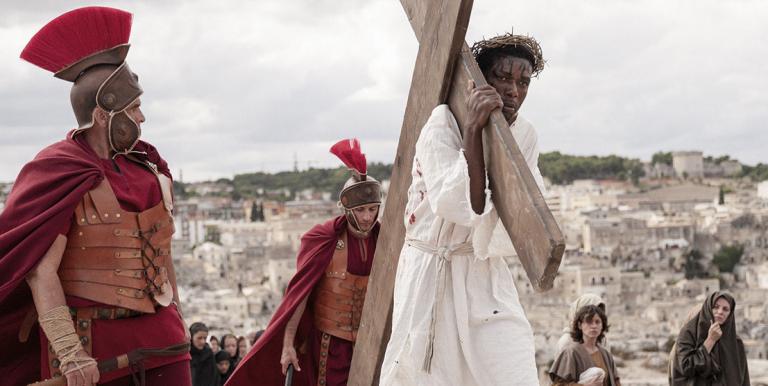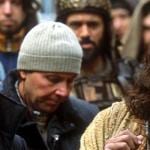Another month, another movie with an African Jesus.
In August, a Dutch film festival hosted the world premiere of Lamentations of Judas, a Dutch film in which real-life Angolan soldiers re-enact the story of Jesus and his betrayal by Judas. (I’ve been meaning to review the film but haven’t gotten around to it yet.)
Then, in September, an Italian film festival hosted the world premiere of The New Gospel, a German-Swiss-Italian film that casts a Cameroonian activist as Jesus — and that also features intriguing links to two of the best-known Jesus movies ever made.
The New Gospel is directed by Milo Rau, a Swiss playwright and activist who conceived the project as the middle installment of a ‘Trilogy of Ancient Myths’ that began with last year’s Orestes in Mosul and will conclude next year with Antigone in the Amazon — and, like Lamentations of Judas, it appears to be a documentary in which people re-enact a Bible story to draw parallels between their situation and that of the Jesus movement.
The film seems to have begun when Rau was invited to take part in a project hosted by the city of Matera, which has been a popular location for Bible movies ever since Pier Paolo Pasolini shot The Gospel According to St. Matthew there in 1964. The city has since been featured in King David (1985), The Passion of the Christ (2004), The Nativity Story (2006), The Young Messiah (2016), Ben-Hur (2016) and Mary Magdalene (2018), among others.
The New York Times says Rau orginally expected to make a “more conventional” movie about the end of Jesus’ life. “But when he discovered shantytowns near Matera where immigrants from Africa live without running water or electricity while they work on farms for as little as 3.50 euros, or about $4.10, an hour, the project’s focus shifted”:
“I decided to not only make a Jesus film, but also to include the reality of their fight for dignity, which is also what Jesus stands for,” Rau said in an interview at the Venice Film Festival, where the film premiered on Sunday.
In “The New Gospel,” immigrant workers describe their experiences, before dressing as Jesus’ disciples and re-enacting Bible scenes. Rau held open castings for roles in the film, and involved activist groups to create a real-life campaign that plays out alongside the fictional scenes.
For the part of Jesus, Rau cast Cameroonian activist Yvan Sagnet, who has organized strikes by migrants working on Italian farms. According to Variety:
In choosing his Jesus, Rau says it had to “be somebody who has the authority to fight for the poor – it can’t be just an actor.” He found a natural talent in Sagnet.
“When I first met him from the first moment I understood that this has to be Jesus because he is the activist leader, but he also has this shy presence.” Like the Jesus of the New Testament, Sagnet is modest, sometimes insecure, but also strong-willed, calculating and politically minded, Rau adds. In organizing the first agrobusiness strikes in southern Italy, Sagnet managed to unite diverse migrant workers by appointing 12 sub-leaders representing 12 communities, like Jesus’ 12 apostles, to create a major solidarity movement of the poor.
Also interestingly, Rau gives a tip of the hat to earlier Jesus films by bringing back actors from the Pasolini and Mel Gibson films. Maia Morgenstern, who played Jesus’ mother Mary in The Passion of the Christ, reprises the role here, while Enrique Irazoqui, who played Jesus in The Gospel According to St. Matthew, plays John the Baptist here.
Variety has a few more quotes from Rau that flesh out his thinking on the film, e.g.:
The Bible, according to Milo Rau, “is a book about a guy losing his fight against state power,” but who ultimately prevails by establishing a movement. It is that struggle that he depicts in his new film, “The New Gospel.” . . .
“The New Gospel,” as all of Rau’s works, follows guidelines he introduced in his Ghent Manifesto as artistic director of Belgium’s NTGent theater, foremost of which is “It’s not just about portraying the world anymore. It’s about changing it.”
“I think you can change the world by describing how horrible this world sometimes is, giving insight and empowering the people that are in bad situations, for example by giving them roles in a big production like ‘The New Gospel.’” . . .
The production of “The New Gospel” led not only to new housing for the migrant workers but also to a fair trade tomato sauce initiative.
The New York Times also has a Q&A with Rau. A few sample quotes:
Can you tell me how you landed on the blended documentary and feature film elements we see in “The New Gospel?”
We call it utopian documentary: It’s a documentary about something that is created through the project, and then documented by ourselves. So we create a campaign, then document the campaign. We could have cut a classical Jesus film, but then you would miss all the political layers.
I did this merging in many of my plays, bringing nonprofessional actors or activists together with trained actors, and we started slowly to build up the campaign that you see in the film; in parallel, we reflect what happens in the campaign. So the invading of Jerusalem becomes a protest walking into Matera, or the destruction of the temple becomes the destruction of the supermarket.
So we tried to include the political meaning of the Bible, and the world cinema meaning of it, because every scene you do in a Jesus film, you have 10, 20, 100 directors who’ve done it before you.
In the film, Yvan Sagnet says that even though he is Catholic, he is not interested in making a film about Jesus as a religious figure. What importance does the figure of Jesus have for you, personally?
I’m from a family that is half Italian and half German and I was raised with Catholicism, but then also in a Marxist way. I was always interested in the Bible, but then when I decided to do a Jesus film, out of love for Pasolini’s “The Gospel According to St. Matthew,” I started wondering who Jesus would be today.
In every scene, we really thought about how to merge art and activism in a way that becomes a statement about Europe today. Because when you start to read the New Testament, you have a guy who’s an activist for the landless people and the periphery of the Roman Empire: that is exactly the situation that we have in Italy now. In the New Testament, the apostles are all migrants who have lost their homes because of the invasion of the Romans, which is exactly the situation in Italy now.
How did you use the Bible as a source for the film?
I really started to read the Bible again while I was doing the film, and I was impressed by the contradictions in the Bible, and I thought, I can’t believe it, this is the holy book? Psychologically it’s so interesting.
Pasolini limited himself to the Gospel of Matthew, but we mixed the gospels. The different gospels are completely contradictory: It’s a crazy script.
For me one sentence from the Bible became the leading sentence of our film, when Jesus says, “Do not think that I have come to abolish the Law or the Prophets; I have not come to abolish them but to fulfill them.” Everything we want for the dignity of these people is in European and Italian law. This situation is illegal. I’m not saying this because I’m a Marxist and I don’t like capitalism, it’s just illegal.
I have no idea what sort of distribution this film will get, but it sounds like one to keep an eye open for — and it could make an interesting double-bill with Lamentations of Judas.
–
Incidentally, side note: The part of Pontius Pilate is played in The New Gospel by Marcello Fonte, the star of 2018’s Dogman, and it turns out Fonte and Irazoqui have collaborated on a Jesus-themed project before, i.e. the music video for Vinicio Capossela’s ‘Il Povero Cristo’ (‘Poor Christ’), which is about the teachings of Jesus going unheeded.
You can watch that video here:














